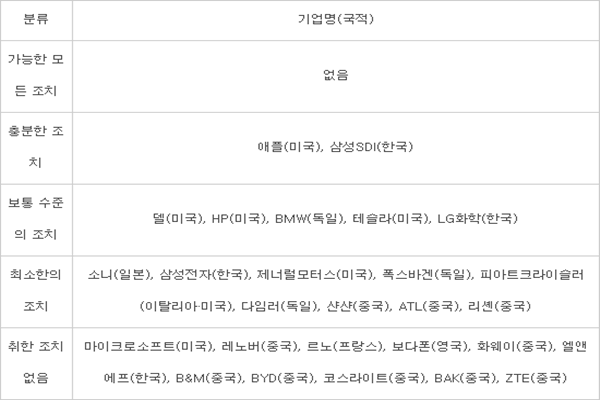Human rights group called Amnesty International is again calling global IT companies to take aggressive actions towards child labor and human rights violation that occur during mining process of cobalt, which is a main raw material for batteries. As major businesses such as Apple and others have responded towards Amnesty International’s request, battery industries begin to worry about a possibility of encountering supply and demand crisis of cobalt.
Amnesty International announced its report on the 15th that evaluated degree of improvement by 29 businesses on supply network of cobalt. It has been about 2 years since it last issued a report that stated real conditions of child labor and human rights violation that occur cobalt mines in Democratic Republic of Congo and their connections with global IT businesses. Its new report has information regarding its evaluations on how major businesses such as Apple, Samsung Electronics, Microsoft, BMW, and Tesla have improved their supply and demand for cobalt.
Amnesty International’s last report revealed that children with youngest at 7 years old were brought to mine cobalt and that these children had worked more than 12 hours while receiving 1 to 2 dollars and did not even have basic safety equipment. Its report also caused repercussions when it pointed out that global electronic businesses did not even inspect basic human rights of its supply network for its products’ raw materials when these raw materials were mined through exploitation of child labor.
Amnesty evaluated 29 businesses based on 5 different stages. As a result, Apple and Samsung SDI were shown to take enough actions. Apple was the first one to introduce its information on cobalt suppliers and found out child labor problems from its supply network while working with Huayou Cobalt since last year. Samsung SDI issued ‘responsible cobalt supply network progress report’ in this past June and it was the first battery manufacturer to do so.
LG Chemicals along with Dell, HP, BMW, and Tesla were evaluated as companies that took normal amount of actions. According to Amnesty’s report, Sony, Samsung Electronics, Volkswagen, Daimler, Shanshan, ATL, and Lishen only took minimum actions while Microsoft, Lenovo, Renault, Huawei, LANDF, B&M, and BYD received lowest grade.
Cobalt is an important raw material that is used to produce secondary battery‘s active anodic materials. Democratic Republic of Congo takes up half of global output of cobalt. China’s Huayou Cobalt is the main supply network of cobalt from Congo and it has CDM (Congo Dongfang Mining), which is one of the biggest mines in Democratic Republic of Congo, as its subsidiary. Cobalt produced from Congo goes through refining and is supplied to global battery manufacturers which then is supplied to global IT businesses and automotive manufacturers. Because Cobalt is not part of Conflict Minerals Law, it is relatively free from social responsibility risk of supply network.
As Amnesty is requesting each business of its investigation and transparent showing of its information again, it will be interesting to see what kind of impact this will have on different industries. After Amnesty issued its report last year, it caused a great sensation as many South Korean and other cobalt-related businesses had carried out investigations. Samsung SDI, LG Chemicals, Apple, HP, Huawei, Sony, B&M, and Huayou Cobalt formed ‘Responsible Cobalt Initiative (RCI)’ in order to work together to solve problems related to their supply network for cobalt. A large electronic business also went on a boycott against cobalt from Congo and affect price of cobalt.
“Cobalt is a major component of a battery for an electric vehicle and plays an important role in continuous energy solutions such as wind power plant and solar energy.” said Joshua Rosenzweig who is the strategy advisor on Business and Human Rights at Amnesty International. “However because increase in number of demands for cobalt can accelerate human rights violation, it is important to think about ethical operation of supply network when carrying out eco-friendly policies.”
However industries predict that it is realistically difficult for these businesses to take practical actions as there is lack of supplies of cobalt due to rapid increase in number of demands for cobalt. “It is difficult to confirm the origin of cobalt ores as cobalt sulfate is made in China, and human rights in Congo are outside of manufacturers’ interests as they are mostly focused on expanding number of suppliers due to demands being higher than supplies.” said a representative for an industry. “Since production of electric vehicles is difficult without cobalt, industries are focused on securing supplies of cobalt regardless of its origin.”
Staff Reporter Jung, Hyeonjung | iam@etnews.com
